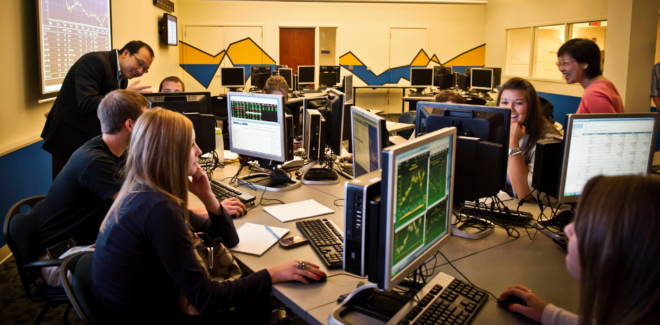The University of Michigan-Dearborn College of Business ranked No. 71 in this year’s 2023 rankings – down a few places from last year’s No. 65 in our 2022 rankings.
Michigan-Dearborn had a 58% acceptance rate for the most recent incoming class – slightly less selective than last year’s rate of 55%, and average SAT score of 1087 for the incoming class – down slightly from the 1092 average scored by last year’s incoming class.
Employment-wise, the B-school held steady as far as their graduates securing full-time positions within three months of graduation, with a great 87.10% of the Class of 2023 landing a position within three months after graduation compared to last year’s 87.95% for the Class of 2022. Internship outcomes rose – with a solid 64% of 2023 grads securing internships this year as compared to last year’s 53%.
The Michigan-Dearborn undergraduate business experience is best described as one with strong faculty support and a variety of unique experiential learning opportunities.
9 TOTAL MAJORS
Michigan-Dearborn undergraduates all enter as pre-business majors when they first arrive, however, in their junior year, they select from nine different business majors including Accounting, Digital Marketing, Finance, General Business, Human Resource Management, Small Business Management, Marketing, Information Systems Management, and Supply Chain Management.
The B-school’s Digital Marketing program is especially unique as it dives into social media marketing, email marketing, and mobile strategies used in marketing campaigns — offering a more tactical and in-depth education than a traditional marketing program.
“The digital marketing program is world-class for sure,” one alumni told us. “Had so many people that were high up in digital marketing do a lot of talks during class and after class too.”
The BBA curriculum is structured around both the Dearborn Discovery Core (the university’s general education curriculum), the BBA core (business core courses), and major requirements. The Dearborn Discovery Core includes a variety of liberal arts topics including courses in humanities and critical and creative thinking. The BBA core offers a strong foundation in all aspects of business from economics to corporate finance.
STRONG FACULTY SUPPORT
Faculty support is one of the main selling points behind the Michigan-Dearborn business education. An overwhelming number of alumni that we surveyed spoke highly about the mentorship and guidance that Michigan-Dearborn business professors provided.
“The professors were professionals who cared about learning rather than forcing information,” one alumni said. “I saw this across the board: the professors cared.”
Surveyed alumni scored faculty a 8.26 out of 10 in terms of their availability for informal discussions and mentoring outside of classes.
EXPERIENTIAL LEARNING OPPORTUNITIES
One of the biggest strengths of the Michigan-Dearborn undergraduate business program is how relevant the education is. Students have a number of opportunities to engage in experiential learning and gain real-world skills. Whether through relevant course topics or experiential capstone projects, Michigan-Dearborn students are challenged to apply their knowledge to the real world.
“Doing business in Detroit course-related projects and learning about the unique business climate in the city at a time that it was rebuilding itself,” one alumni told us.
“The capstone project involved taking learning from every single part of our time at the school and bringing it all together,” another alumni said. “We ran a simulation of a car manufacturer throughout the whole semester, competing against other manufacturers (students) in the class. You had complete control over everything; pricing, R&D, release cycles, vehicle types, market research.”
Outside of the classroom, Michigan-Dearborn students also have a variety of opportunities to engage in real-world learning. Students can partake in a number of consulting projects where student teams coordinate with clients on projects of up to 15 weeks to address a real need or issue within an organization. Students work with stakeholders throughout the term and conclude with a final deliverable. Consulting project topics range from general consulting to supply chain logistics and business analytics.
Students can also take part in project-based internships, which allow them to work for organizations that don’t necessarily need a full-time intern but seek support for smaller projects or initiatives. Project-based interns work part-time on specific projects from website building to social media plans.
Both in and out of the classroom, Michigan-Dearborn students are given an abundance of unique opportunities to actively engage in real-world learning. Add to that a strong sense of faculty support and guidance and you have a solid foundation for a successful career.
Alumni say:
“I had multiple chances to work for businesses while still in school, giving me real life opportunities – for instance, we were given the opportunity to redesign a company’s website in a digital marketing class, working with many real companies”
“Project management class played a key role in preparing me for the real world. It taught me the importance of meeting deliverables and managing my time.”
“The college of business and school of engineering project was very interesting. I loved the fact that two different groups had to work together for this project, like you might see in the real world. It brought up a lot of real world situations, like what sometimes happens when there is miscommunication or someone is not pulling their weight on the team. It was a good team experience.”
“We took an experiment course acting as data consults for a local firm where we embedded into a company and used academic models to provide insight and offer intelligent recommendations to their operations — real world experience, immediately applied.”
“I participated in the university’s study abroad program in Padova, Italy. It was a life changing experience. I was able to understand business cultures and perspectives on a global level.”










